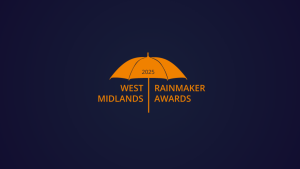Round table report: preparing leaders for the future in a rapidly changing world
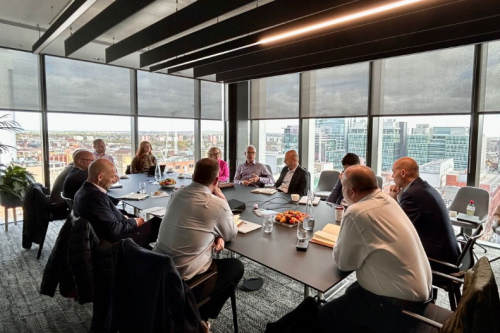
Leading business voices joined TheBusinessDesk.com and Curium Solutions, to discuss how they are preparing themselves and their employees to get ahead of the trend.
Being adaptable and having a continuous learning mindset will come, once leaders foster a culture where employees are constantly developing new skills.
Our panel joined together at RSM’s Birmingham office, to discuss how technology is just a tool, how to navigate uncertainty and unlock growth and what they’re doing as leaders as the pace of change continues to accelerate.

She said: “For example, if you look at the commitment China made 20 years ago to electric vehicles, and now we’re seeing that come through. But businesses have barely been able to know until fairly recently what their capital allowances for next year would be.
“When you’re looking to make some large investments, it’s incredibly challenging to try and plan a strategy as well what your customers then investment strategy will be”.
This challenge, whilst not new, has been exacerbated by elections in 70 to 80 jurisdictions across the world, creating even more uncertainty believes Sam Mills, partner at EY.
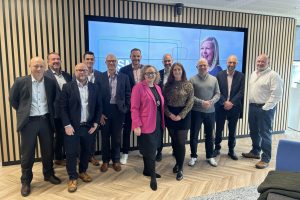
“Where I struggle is people, managing this bank of talented individuals that are motivated by totally different things”.
For James Farrow, director and co-founder of Curium Solutions, there’s a push to see how leaders can “start looking around corners” and planning for the next two to three years ahead.
He said: “Leaders are really struggling with that because they’re constantly waiting for the next crisis.
“If you’re not learning a new skill each year, you’re going to be out of date within 18 months, and that’s why organisations and leaders need to look at this for themselves and everybody in the workforce”.
Reflecting on businesses coming through the Covid-19 pandemic, he said that many have “been resting on their laurels following the crisis and not thinking what is the future looking like? How do we look around corners and prepare our teams, because we can’t keep reacting to crisis after crisis”.
CEO of manufacturer PP Automation Tony Hague, believes however that people have been tasked with dealing with a “myriad of stuff thrown at them since 2020” with leaders going into “survival mode”.
“There is a point where you have to come out of survival mode and get back into a growth mindset and say it’s behind us now, we’ve got to think more strategically, what are we doing as a business?”
The pandemic forced a dynamic change in workforce says Jason Longhurst, UK head of sustainable investment at Prologis. “Our customer base is heavily consolidating at the moment, with many observing and saying they’re going to wait and see. So what is the trigger?”
Andy Begley, CEO of Shropshire Council said “being right in the middle of the pack is the safest place” but it’s “vanilla” and the pandemic “forced us into making decisions really quickly.
“Having clear communication was what employees wanted. I found my organisation reacted so positively to clarity of communication and that bravery of decision making and that’s what I’ve continued to encourage.
“Coming out of Covid when we’re in financial crisis, I was investing in leadership development for 400 people throughout the organisation and that seemed really counterintuitive, but it’s really repaid me”.
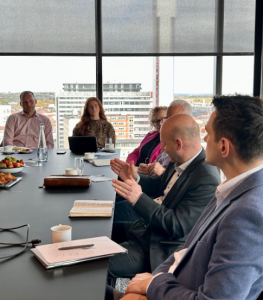
He said: “When advising on private equity deals with a three to five-year growth plan, the business plan that investors will pin their money on is the management teams and its succession. It’s really hard to pin down.
“Leadership has become so crucial because you have to lead from the front and be in it with your staff.
“Remote working has been a hot topic and I think we’re coming to the other side of this now. But if you, as a leader are sat at home five days a week working remotely, you’re not going to have the reciprocity with the workforce”.
Farrow believes that leaders do not look at themselves as a leader, but instead “a senior one of them”. He said that the challenge of leadership is that people aren’t studying it as part of their job.
“If you don’t see yourself as a leader, you’ll never find time for the things that are leadership things. You only find some things for the things you identify with”.
Gareth Jones, head of strategic finance for the Midlands at Virgin Money said that “leadership is something I think you’ve got to continuously learn.
“Its biggest challenge is showing up when you can’t control the outcome because you don’t necessarily know what the outcome is going to be.
“Looking at customers that we work with, but also our own business, I think is about finding the potential in people and in processes and just having courage”.
Another key issue discussed was the lack of strategic planning by UK businesses.
Ben Collett, partner for performance improvement at RSM said: “People are very reactive and strategy isn’t just about growth – it’s about operational strategy as well. The biggest challenge at the minute is around training and skills gaps.
“Every company you speak to is linking up with education and saying we can’t rely on them to turn out graduates, so instead are putting in place apprenticeships and training programmes and work closely together. This skills gap has been caused by education”.
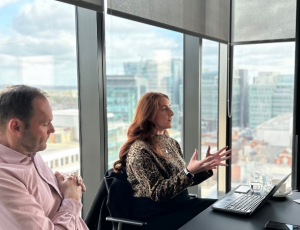
He said: “Every company assumes it’s amazing and so it’s no longer what can I give to the company, there’s been a shift to where’s the value back?
“The clarity of an investable offer, both as the employer and the employee of hedging a mutually beneficial opportunity is so important”.
Tony Hague is focused on the next generation of leaders and has gone into local schools and colleges to change their perception of manufacturing.
He said: “We’ve put the work in by engaging with schools and education to talk about how manufacturing and engineering is actually a really exciting place to work and it’s not low paid.
“If you look at the demographics of our shop floor, I love it! We’ve got lots of young people coming into manufacturing and engineering and even families working in the business”.
PP Automation is also looking at ways to give back to its staff and has introduced a four-day working week.
Hague says that: “production efficiency has never been so high, unauthorised absenteeism has dropped and engagement went up. It’s created a competitive workforce environment and it’s worked really well for us”.
The rapid advancements in technology have made it difficult for leaders to keep up. And with the adoption of AI, both leaders and employees will need to stay on top of emerging technologies like AI and understand how they can be harnessed productively.
Prologis has adopted AI into the business and within the first month, 60% of the workforce asked if their own job is going to exist in the future.
He said accounting teams are using AI to improve their efficiency and already there are “high growth areas we can already spot that are outside of every area, predicted for the business. What’s really interesting is the functional side of the business is seeing the highest impacts and we’re seeing that in our customer base as well”.
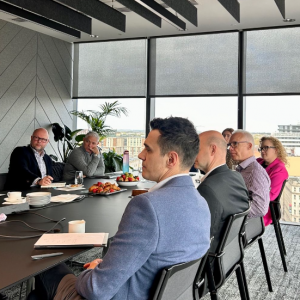
“It’s about progression – constantly staying on top of training and developing. It enables people to go onto the next role. People need to embrace it or they’ll fall behind”.
Helen Brocklebank echoed these thoughts saying: “You’re able to spend more time thinking what’s going on in your business and can focus on the high-value tasks.
“Excel coming in was once feared to be the end of accountants – but that wasn’t the case. AI is a code for processing binary decisions. It’s how you use this information. I always tell my team to look at the questions it creates”.
There are fears however regarding what AI means for professional services, especially when it comes to billing.
For Sam Mills, a member of his team used the technology to create a data set for profit which usually cost tens of thousands of pounds, but this instead cost £4k.
He said: “they cut the value I thought we were adding so it’s really important to look at what this adoption could mean for professional services”.
As leaders attempt to prepare for the evolving world, it’s clear that the skills gap could grow with the advancements if employees don’t invest in the development of their staff.
Clear communication and collaboration is essential, to boost teams with different motivations and expectations and encourage the next generation of leadership.
This next-gen leader needs to be adaptable, personable, savvy and strategic, use technology as a tool and razor-sharp focus on its people.

